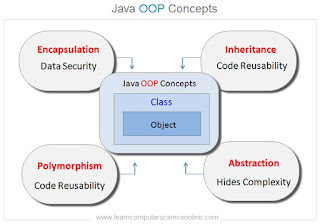OOPS Concepts
Object-oriented programming System(OOPs) is a programming paradigm based on the concept of “objects” that contain data and methods.
The primary purpose of object-oriented programming is to increase the flexibility and maintainability of programs.
Object oriented programming brings together data and its behavior (methods) in a single location(object) makes it easier to understand how a program works.
Principles of OOPS
They are an abstraction, encapsulation, inheritance, and polymorphism.
Abstraction is a process where you show only “relevant” data and “hide” unnecessary details of an object from the user. For example, when you login to your bank account online, you enter your user_id and password and press login, what happens when you press login, how the input data sent to server, how it gets verified is all abstracted away from the you.
Encapsulation is one of the best Java OOPs concepts of wrapping the
data and code. In this OOPs concept, the variables of a class are always hidden from other classes. It can only be accessed using the methods of their current class. For example - in school, a student cannot exist without a class.
data and code. In this OOPs concept, the variables of a class are always hidden from other classes. It can only be accessed using the methods of their current class. For example - in school, a student cannot exist without a class.
Inheritance is one of the Basic Concepts of OOPs in which one object acquires the properties and
behaviors of the parent object. It’s creating a parent-child relationship between two classes. It offers robust and natural mechanism for organizing and structure of any software.
behaviors of the parent object. It’s creating a parent-child relationship between two classes. It offers robust and natural mechanism for organizing and structure of any software.
Polymorphism is the concept where an object behaves differently in
different situations. There are two types of polymorphism – compile time
polymorphism and runtime polymorphism.
Compile time polymorphism is achieved by method overloading.
Advantages of OOPS
- OOP offers easy to understand and a clear
modular structure for programs.
- It also enhances program modularity
because every object exists independently.
- OOP is faster and
easier to execute
- OOP makes it
possible to create full reusable applications with less code and shorter
development time





